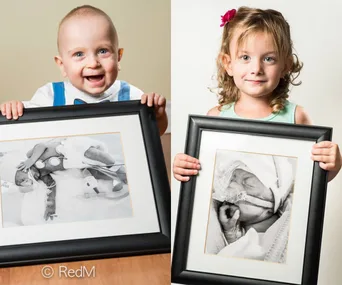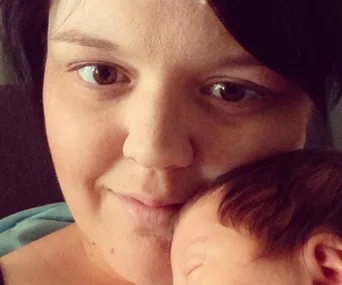When Emma Macdonald gave birth to her daughter, her hospital room was filled with lavish bouquets of flowers. Like most new mothers, she appreciated the beautiful sentiment.
But soon there was nowhere to put them. Within days, they would be thrown away and forgotten about. Getting a newborn, baby capsule and bags into the car was enough to deal with. And so hundreds of dollars disappeared, just like that.
It was seeing an opportunity to redirect some of this cash that led Emma, an award-winning Canberra journalist, and her obstetrician Steve Robson to establish Send Hope Not Flowers: a charity that helps less fortunate mothers give birth safely.
“I was in a post-baby haze, having recently given birth to my second child Imogen, when Steve asked my advice on an idea,” recalls Emma.
“He was deeply affected by a photo essay [depicting a mother dying in childbirth] in Time magazine – having never lost a new mother to bleeding in more than 20 years.
“He wondered if we could encourage people to make a donation to help another mother have a safe birth in the developing world rather than sending flowers. It came to me in an instant to call it Send Hope Not Flowers. Because flowers die and women giving birth shouldn’t.”
In just five years, their small team of four has turned a simple idea into a successful enterprise that has garnered the attention of a supermodel campaigner and is poised to expand overseas.
For Emma, who has juggled running the charity alongside her day job as a senior reporter at The Canberra Times and raising a young family, it has been a labour of love.
“I just had to look down at my tiny new bundle and imagine what her life would be like without me to meet her every need,” she explains.
“I imagined life for my (then) four-year-old son Thomas if I had not survived Imogen’s birth. I knew childbirth was much riskier for women in developing countries but I had no idea that a woman dies every two minutes from complications of childbirth.”
Indeed, the statistics are startling. To put the issue into perspective, a woman is about 80 times more likely to die giving birth in Papua New Guinea (PNG) compared to Australia.
“If the mums die, what happens to the babies?” says Emma.
“I find this almost too heartbreaking to think about.”
The idea behind Send Hope Not Flowers is simple: when a baby is born in Australia, friends and family can go to the charity’s website and make a donation. Then the new mother receives a card explaining to her that money spent in her and her baby’s honour will be used to fund life-saving maternal health programs in the Pacific region.
Despite the heavy workload taken on by the unpaid team of four, which also comprises an internet entrepreneur and a communications consultant, they have no doubt it’s worth the effort.
“There never seem to be enough hours in the day (between the four of us we have 10 children) and we do all the work once our day jobs have finished, so there are many emails bouncing back and forth between us between midnight and 2am,” says Emma.
“But the chance to establish a charity which helps mothers and babies really has been a highlight of my life – second only to having my own babies.”
And what started out as a small idea looks set to go global. Not long after Send Hope Not Flowers was launched, Emma received an email from supermodel Christy Turlington Burns.
“After giving birth 12 years ago and suffering complications, which may have ended in tragedy were she not in the US, Christy set up a global mobilisation campaign called Every Mother Counts,” says Emma.
“She wrote to congratulate us on our “beautiful” idea and to offer her support.
“We’ve been made an official partner of Every Mother Counts. Christy and her team are keen to help us establish Send Hope Not Flowers in the US. We’ve also had interest in setting up in the UK and New Zealand.”
The projects that Send Hope Not Flowers support include providing bundles of medical, obstetric and baby supplies and funding midwife training.
Already, it is making a huge difference: the maternal death rate in a PNG province that receives these bundles has dropped by a remarkable 78 per cent, according to research published in the Australian and New Zealand Journal of Obstetrics and Gynaecology earlier this year.
“Before the Second World War, the maternal mortality in Australia was the same as PNG now,” says Emma.
“We believe that with hard work and determination, we can make the same maternal health advances in PNG and neighbouring countries. These women deserve the same chance to give birth safely as Australian women do.”
To make a donation or buy a Christmas Card this holiday season, go to sendhope.org.



